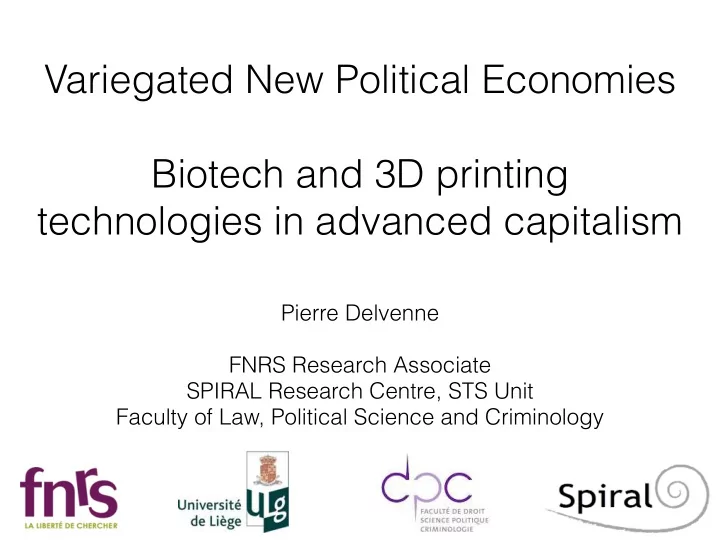

Variegated New Political Economies � Biotech and 3D printing technologies in advanced capitalism � Pierre Delvenne � FNRS Research Associate SPIRAL Research Centre, STS Unit Faculty of Law, Political Science and Criminology
Introduction (1) • New technologies are increasingly presented as solutions to the most important issues relating to economic, political, social, or ecological crises • They create promises but also expectations for governments, industries and social groups with conflicting interests • New political economies emerge around new technologies such as biotech or 3D printing
Introduction (2) • STS are paying greater attention to interactions between new technologies and politico- economic orders (e.g. Slaughter and Rhoades 2004, Mirowski and Sent 2008, Lave et al. 2010, Bonneuil and Joly 2013) • Micro focus of STS vs macro focus of political economics, need for interdisciplinary approach showing co-production processes at work (Jasanoff 2004)
Political economy: a tentative definition A political economy is a narrative embedded in materialities and supported by public policies , which aims to produce economic and social value by relying on the potential of new technologies
Bioeconomy « The Bioeconomy offers Europe a unique opportunity to address complex inter-connected challenges, while achieving economic growth . It can assist Europe in making the transition to a more resource efficient society that relies more strongly on renewable biological resources to satisfy consumers' needs , industry demand and tackle climate change . » � European Commission, « Innovating for Sustainable Growth: A Bioeconomy for Europe »
STS studies on biotechnologies and life sciences • Emphasis on the role of marketization and an enlarged regime of IP rights, or the co-production of biotech and legal/constitutional frameworks (Jasanoff 2011) • Global bioeconomy in which « biovalue » (Cooper 2008) or « biocapital » (Sunder Rajan 2006) offer new opportunities for economic growth • Value come from the application of knowledge to nature and its subjection to IP rights (Birch and Tyfield 2013)
The next steps • What about other knowledge-based global political economies? • Are there recurrent patterns for technology-related political economies? • What does it imply for the further development of recent/emerging political economies?
New manufacturing economy « A once-shuttered warehouse is now a state-of-the art lab where new workers are mastering the 3-D printing that has the potential to revolutionize the way we make almost everything » � Barack Obama, State of the Union speech, Feb. 2013
Variegated political economies: discussion • By now, mainly practical or policy-oriented literature on 3D printing, few STS studies (except Robinson and Lagnau 2014) • Both biotech and 3D printing are heralded as transforming the world in the 21st century • Bioeconomy and new manufacturing economy present contrasting cases (different societal embeddings, promises and expectations, or connecting with different master narratives) • Underlying imperative to invest in, share or protect new knowledge, technologies and human creativity for increasing market values and competitiveness � • Proliferation of conflicts and ethical, legal and societal issues ( ELSI )
Conclusions • My project aims to contribute to the understanding of the formation of political economies around new technologies and their implications in two domains • Both domains connect with cornucopian imaginaries of abundant knowledge, natural and creative resources (see Birch et al. 2010 on bioeconomy) � • Emerging tension between empowerment of individuals (e.g. Rose 2007, Rabinow 2009) versus neoliberal colonization of new domains (nature and human creativity)
Thank you for your attention! � Contact: pierre.delvenne@ulg.ac.be www.spiral.ulg.ac.be
Research objectives 1) Analyze the global constructions of the bioeconomy and the new manufacturing economy � 2) Carry out case studies to trace the local conflicts among national governments, industries and social groups, and the outcomes of such conflicts � 3) Identify recurrent patterns for technology-related conflicts in new political economies, and anticipate on what this implies for further developments � �
Disciplinary perspectives and methodology • An interdisciplinary project at the crossroads of science and technology studies and political economy • An innovative approach in terms of co-production • The project combines a broad set of qualitative methods • It involves four field research phases
Global politico- economic orders STS/Pol Eco � Interdisciplinary � approach � Local practices and contexts of new technologies Biotech 3D 2 case studies 2 case studies Analysis and comparison
The co-production of new technologies and politico-economic orders: � The domains of biotechnologies and 3D printing � Pierre Delvenne � FNRS Postdoctoral Researcher SPIRAL Research Centre, STS Unit Faculty of Law, Political Science and Criminology
FNRS CR 2010 2011 2012 2013 2014 FNRS-MINCyT € 25.000 ( € 12.500) WBI-CAPES (Brésil) € 95.350 ( € 38.850) PACITA (FP7) € 5.512.046 ( € 299.600) TASTI (PDR-FNRS): € 586.350 (471.136 € )
FNRS CQ 2014 2015 2016 2017 2018 PACITA (FP7) € 5.512.046 ( € 299.600) PACITA 2 (H2020) TASTI (PDR-FNRS): € 586.350 ( € 471.136) GIGS (PDR-FNRS): € 519.950 FNRS-CONICET € 25.000 WSL-Labs (Creative Wallonia): € 486.170 ( € 51.750) INSOLL (DG06 Germaine Tillion): € 653.073 FIRST Spin Off DGO6 Mesydel: € 253.600 GABRIELA (H2020) ERC Starting Grant
A political economy is a narrative embedded in materialities and supported by public policies , which aims to produce economic and social value by relying on the potential of new technologies
Recommend
More recommend